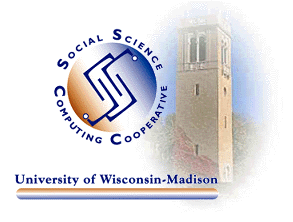
Welcome New Members!
Bringing PCs into the Building
SSCC Fall Training Schedule
Other On-campus Training Opportunities
Recap on SSCC's UNIX/Linux Computers
New Winstat Server
Hopefully, we've gotten to welcome each of you in person either at one of our orientation sessions last week or at the SSCC Consulting office. If we haven't though, please drop by Social Sciences 4315 to pick up a packet of information and to sign up for a 30 minute computer orientation session. The amount of computing resources available at SSCC can be overwhelming and a 30-minute orientation is time well spent even for the most experienced computer users.
We ask anyone bringing in a Windows or PC or laptop for use in the Social Science Building to first take it to the SSCC Help Desk to be thoroughly checked out. It is very important for Windows users to keep your operating systems patched and antivirus software up-to-date:
SSCC Publication, Keeping Your PC Secure, contains a lot of very useful infomation, especially for home PCs, or any other PC that doesn't log in to PRIMO.
Mac users -- if you are not currently running Software Update monthly, please bring your system to the SSCC Help Desk in Soc. Sci. 4315 prior to connecting it to the building network.
SSCC's Fall training schedule is now available on SSCC's training web pages. We are teaming up with Sociology 365, Computing in Social Research, so you'll find many topics offered Tuesday/Thursdays, 9:30 - 10:45, including several SAS classes (one on SAS macros) and our ever-so-popular "Creating a Web Page" class. We are also offering once again a class on Condor. If you run large Linux jobs, this is definitely a class you should check out. Remember that all SSCC training sessions require preregistration. Register early before sessions fill!
The SSCC provides a lot of training classes each semester. Unfortunately, we can not offer all levels of training for all software. Fortunately, there are other resources on campus that can supplement SSCCs training:
If you've been away the for past month or so, a lot has changed on our UNIX/Linux network. SSCC's remaining two Tru64 UNIX computers, HAL and NORMAN, were retired. HAL was replaced with a new and much more powerful Linux computer. And, we moved the SAS license from Condor to HAL which means you can now run SAS jobs or either KITE or HAL. Please only run one statistical software job at a time though. Our plan was to provide two Linux computers for interactive use, KITE and HAL, but after a recent operating system upgrade on KITE, SPSS no longer runs properly. So, until SPSS fixes the problem, we've added a third interactive computer (with an older version of Linux), OWL, just for running SPSS jobs.
In addition, we've added four more dual 2.4Ghz Xeon servers to our Condor high-throughput computer cluster for running large STATA, R, Fortran, and C/C++ programs. The five older dual processor servers have been temporarily removed from the cluster for system upgrades. All but one will be available again very shortly. (The 5th server won't be available again until we get a fix for the SPSS problem.). For more information on Condor, refer to the SSCC Publication, An Introduction to Condor. Also note that we are offering a training session on Condor in October. See the relate article in this issue.
See the related articles in last month's SSCC News for more detailed information on UNIX/Linux changes.
We've added a new terminal server. The new machine, with two 3.0 GHz Xeon processors and 4Gb RAM has been designated Winstat3. It is ideal for large Windows-based statistical jobs. If you are using the Citrix ICA client and want to connect to Winstat3, instructions for adding a new connection are found near the end of Installing the Citrix ICA Client.
Go to previous editions of
SSCC News.
Go to the SSCC Home Page.
© 2004 University of Wisconsin Social Science Computing Cooperative